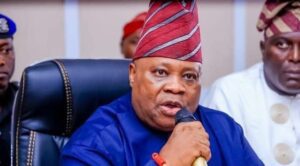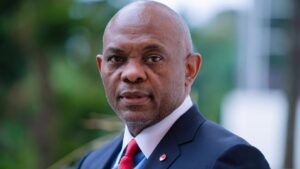2023 Elections: INEC vows to prosecute 215 electoral offenders, erring RECs
By Joel Oladele, Abuja
The Independent National Electoral Commission (INEC) has vowed to prosecute 215 electoral offenders who violated the electoral law in the last General elections in Niegria.
This was revealed at a meeting the Chairman of the Independent National Electoral Commission (INEC), Prof. Mahmood Yakubu held with Resident Electoral Commissioners (RECs) across the country for introspection.
Speaking at the meeting which was held at the National Headquarters of the Commission in Abuja on Tuesday, Yakubu said the commission as part of the review and evaluation process, has received 215 case files of electoral offenders ready for prosecution.
He noted that INEC is working in collaboration with the Nigerian Bar Association (NBA) to fast track the process, noting that NBA is offering the legal services on pro bono.
“I can also confirm that we have received 215 case files from the Nigeria Police following their arrest and the conclusion of investigation into electoral offences arising from the 2023 General Election.
“We are working with the Nigerian Bar Association (NBA) to prosecute the alleged offenders. Already, the NBA has submitted a list of 427 lawyers across the country who have volunteered to render pro bono services to the Commission.
“They are not charging legal fees but by mutual agreement the Commission will provide a token amount to cover for filing fees/expenses. We are most grateful to NBA and its President, Yakubu Maikyau SAN, for this historic collaboration.”
Prof Yakubu also said the commission is working with the Economic and Financial Crimes Commission (EFCC) and the Independent Corrupt Practices Commission (ICPC) on issues relating to vote buying.
He promised that the reports of the exercise will be made available for the general public.
“Similarly, we are working with the Economic and Financial Crimes Commission (EFCC) and the Independent Corrupt Practices Commission (ICPC) on the prosecution of cases relating to vote buying and associated violations.
“In line with our policy, at the end of the internal review and engagement with stakeholders, a comprehensive report will be published by the Commission.
“Furthermore, the Commission has so far received reports from 54 accredited national and international observers. We will give equal prominence to all the reports and review them in a holistic manner to ensure that necessary lessons are learnt from their conclusions and recommendations.
“As a Commission, we hope to continue to count on the support of stakeholders to improve the electoral process in Nigeria,” he said.
While charging the commissioners to remain loyal in the discharge of their duties, the INEC boss added that those found culpable of any misconduct during the last election will be dealt with.
Recall that one of such is the suspended Resident Electoral Commissioner (REC) for Adamawa State, Hudu Yunusa Ari who announced the candidate of the All Progressives Congress (APC) in the state Aishatu Dahiru Ahmed Binani as the winner in a controversial manner.
Yakubu also reminded of the next tasks ahead of the commission, which are the off-cycle and bye-elections in some states of the country, especially the Bayelsa, Imo and Kogi States governorship elections scheduled for 11th November 2023.
“Our work in INEC is enormous. As Resident Electoral Commissioners, you are no doubt aware that there is no election season in Nigeria any longer. Numerous off-cycle and bye-elections are held throughout the period between one general election and another.
“Even as we commence our review of the conduct of the 2023 General Election and barely a few weeks after the inauguration of the National and State Houses of Assembly, we are already confronted with four bye-elections as a result of resignation in the case of Surulere 1 Federal Constituency of Lagos State and death in respect of Jalingo/Yorro/Zing Federal Constituency of Taraba State, Chibok State Constituency of Borno State and Chikun State Constituency of Kaduna State.
“Furthermore, the Commission is preparing for three off-cycle Governorship elections in Bayelsa, Imo and Kogi States, which are scheduled for 11th November 2023. We have already published the final list of candidates for the elections and campaign in public officially commenced on 14th June 2023. The Commission will soon commence the regular stakeholder engagements ahead of the elections.
“Let me at this point specifically reiterate to the Resident Electoral Commissioners that we are commencing these debriefings with you because you are central to the conduct of elections. Many of you performed very well during the general election under extremely challenging circumstances.
“I commend you for that. However, a few of you did not properly manage the tasks lawfully bestowed upon you for which the Commission has taken some administrative action. I urge you to remain loyal to your oath of office.”
Speaking on the general assessment of the elections, Yakubu said in spite of many challenges, there was a great improvement compared to previous elections in the country.
“Among the positive stories is that the security challenge which threatened to derail the elections did not materialise. Concerns that the polls will be disrupted by the perennial insecurity across the country fizzled out on Election Day as the elections were largely peaceful.
“Despite currency and fuel challenges and widespread attacks on our personnel and facilities nationwide, the Commission proceeded with the election as scheduled.
“The first set of elections, the Presidential and National Assembly, were held as planned for the first time in the last four General Elections conducted in the country. Accreditation of voters using the Bimodal Voter Accreditation System (BVAS) has generally been scored very high by voters. Our records show that the success rate for BVAS accreditation stands at 98% compared to the Smart Card Reader’s 29.2% during the 2019 General Election.
“Above all, despite the divergent opinions about the outcome of the election, the overall outlook suggests that it is a fair reflection of a complex multi-party democracy. We wish to remind Nigerians that elections were held for a total of 1,491 constituencies made up of one Presidential, 28 Governorship, 109 Senatorial, 360 Federal Constituencies and 993 State Assembly seats.
“Our record shows that these elections have produced the most diverse outcomes ever recorded since 1999. Today, five political parties produced State Governors, seven parties won Senatorial seats, eight are represented in the House of Representatives and nine in State Houses of Assembly.
“Clearly, the 10th National Assembly is certainly the most diverse in party representation since 1999. In some States around the country, different political parties controlled the legislative and executive arms of Government.
“What is clear from these records also is that the days of single party dominance of our national politics are probably gone. Furthermore, many prominent candidates lost in the constituencies they contested, and political parties lost in some of their presumed strongholds.
“Still, we must acknowledge that there were also some challenges, which were structural, infrastructural and human in nature. Indeed, it is in furtherance of our determination to address the challenges as we prepare for future elections that the Commission is commencing its post-election review engagements today,” Yakubu noted.




